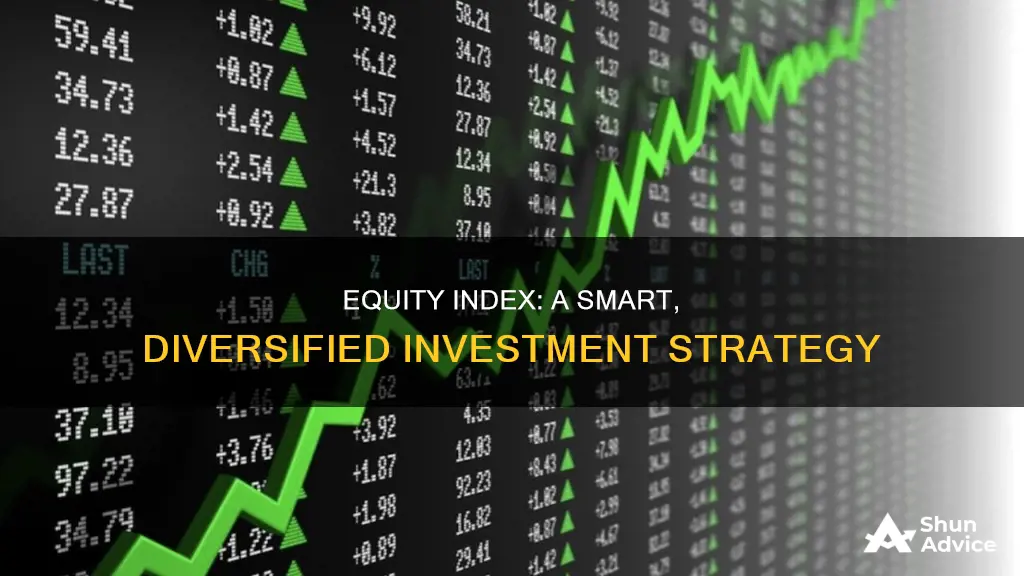
Index funds are a passive investment strategy that aims to replicate the performance of a benchmark index, such as the S&P 500 or the Dow Jones Industrial Average. By investing in an index fund, individuals can gain exposure to a diversified portfolio of stocks or bonds that mirror the composition of the chosen index. This approach offers several benefits, including lower fees, broad market representation, transparency, historical performance, and tax efficiency. Index funds are also a simple and cost-effective way to invest, making them attractive to both beginner and expert investors. However, it's important to consider the limitations of index funds, such as the lack of flexibility to pivot away from the market during downturns and the potential impact of underperforming large companies on the overall index.
| Characteristics | Values |
|---|---|
| Type of investment | Passive |
| Investment strategy | Buy-and-hold |
| Performance | Attempts to replicate the performance of a broad market index |
| Investment management | Low management fees |
| Investment research | Minimal |
| Investment risk | Managed |
| Investment choice | Wide range |
| Investment cost | Low |
| Tax efficiency | High |
What You'll Learn

Low fees and tax efficiency
Index funds are a passive investment strategy that seeks to replicate the performance of a benchmark index. They are a low-cost, easy way to build wealth and are ideal for those looking for a diversified investment that tracks overall market trends.
Low fees
Index funds are passively managed, meaning they do not require active fund managers to pick stocks or time the market. As a result, they have lower management fees and expense ratios than actively managed funds. The funds also trade less frequently, reducing transaction fees and commissions.
Tax efficiency
Index funds are tax-efficient because they make fewer trades, resulting in lower capital gains distributions. This passive strategy also means that index funds do not need research analysts, further reducing costs.
Index funds are a simple, effective way to gain exposure to a broad, diversified portfolio at a low cost. They are a great choice for beginners and expert investors looking for a long-term, passive investment strategy.
Protecting Your Reputation: A Smart Investment Strategy
You may want to see also

Broad market exposure and diversification
Index funds are a great way to get broad market exposure and diversification. By tracking a market index, such as the S&P 500 or Nasdaq Composite, index funds offer investors a simple and cost-effective way to gain exposure to a wide range of stocks or bonds. This diversification can help spread risk across different markets and asset classes, reducing the impact of any single investment on the overall portfolio's performance.
For example, the S&P 500 index includes 500 of the top companies in the US stock market and is considered the best representation of the overall US stock market's performance. By investing in an S&P 500 index fund, investors gain exposure to a diverse range of large US companies across various sectors, reducing the risk associated with investing in individual stocks.
Index funds also offer the benefit of low costs. Because they are passively managed, index funds have lower management fees and expense ratios than actively managed funds. This means that investors can access a diverse range of investments without incurring high fees typically associated with active fund management.
Additionally, index funds are tax-efficient. Their passive nature results in less frequent trades, reducing capital gains distributions and making them more tax-efficient than actively managed funds.
Overall, index funds provide a simple and cost-effective way for investors to gain broad market exposure and diversification, making them a popular choice for those seeking a long-term investment strategy.
Growth Equity Investing: Global Strategies for Success
You may want to see also

Passive management and low management fees
Index funds are passively managed, meaning they do not require active decision-making about which investments to buy or sell. Instead, they aim to replicate the performance of a benchmark index, such as the S&P 500. This passive management strategy has several benefits.
Firstly, it results in lower management fees. Index funds require less work than actively managed accounts, as there is no need to pay for research analysts or portfolio managers to actively select securities or time the market. This means that index funds can charge lower expense ratios, often as low as 0.04% compared to 0.44% or more for actively managed funds.
Secondly, the passive nature of index funds leads to lower tax exposure. Index funds tend to trade less frequently, resulting in fewer taxable events and, therefore, lower capital gains taxes for investors.
Additionally, the passive management of index funds provides a more hands-off approach for investors. This can be advantageous for those who do not have the time, knowledge, or desire to actively manage their investments. By investing in index funds, individuals can put their portfolio on "autopilot," allowing them to build wealth over time without the need to become stock market experts.
Finally, passive management helps to reduce some of the biases and uncertainties associated with active stock-picking strategies. This can lead to better investment performance over the long term, as evidenced by the fact that index funds have consistently outperformed actively managed funds. According to the S&P Indices Versus Active (SPIVA) scorecards, about 9 out of 10 actively managed funds failed to match the returns of the S&P 500 in the past 15 years.
In summary, the passive management of index funds leads to lower management fees, lower taxes, a more hands-off approach for investors, and reduced biases in investment decision-making. These factors contribute to the growing popularity of index funds as a low-cost, effective way to build wealth over time.
Stockholder Investments: Equity Impact and Analysis
You may want to see also

Long-term solid returns
Index funds are a great way to generate long-term solid returns. Here's why:
Long-term Performance
Index funds have been around since the 1970s and have a proven track record of strong long-term performance. The Vanguard 500 Index Fund, founded in 1976, is known for its overall long-term performance and low cost. Over the years, it has closely tracked the S&P 500, one of the most widely followed indices. As of 2024, the average annual return for the S&P 500 over the long term is around 10%.
Low Costs and Fees
Index funds are passively managed, meaning they don't require active fund managers to pick stocks or time the market. As a result, they have lower management fees and expense ratios compared to actively managed funds. The Vanguard 500 Index Fund, for example, has an expense ratio of just 0.04%. This low-cost structure makes index funds an attractive option for investors, especially when compared to the higher fees associated with actively managed funds.
Diversification
Index funds provide investors with instant diversification across various sectors and asset classes. By investing in an index fund, you gain exposure to a broad range of stocks or bonds, reducing the risk associated with individual stocks. This diversification helps minimize unsystematic risk related to specific companies or industries, providing a more stable investment option.
Tax Efficiency
Index funds are also known for their tax efficiency. Due to their passive nature, index funds tend to make less frequent trades, resulting in lower capital gains distributions. This means that investors in index funds may benefit from lower tax bills compared to those in actively managed funds.
Simplicity and Accessibility
Index funds offer a simple and accessible way to invest, especially for beginners. They require minimal investment research as the fund manager's primary goal is to match the performance of the underlying index. Additionally, the diverse nature of index funds means that investors can choose from a wide range of options, including broad market indices like the S&P 500 or more focused indices targeting specific sectors or trends.
In summary, index funds provide a solid long-term investment option due to their strong historical performance, low costs, diversification benefits, tax efficiency, and simplicity. They are a great choice for investors seeking a passive investment strategy with the potential for solid returns over the long term.
Equity Investment: Understanding the Basics of Stock Ownership
You may want to see also

Consistent performance
Index funds are a passive investment strategy that aims to replicate the performance of a benchmark index. This strategy seeks to match the risk and return of the overall market, based on the theory that the market will outperform any individual stock picker over the long term. This makes index funds an effective way to manage risk and generate consistent returns.
Index funds are designed to be a passive investment strategy, meaning they do not involve active stock picking or market timing. Instead, they track the performance of a specific index, such as the S&P 500 or the Dow Jones Industrial Average. This passive approach has several benefits, including lower management fees and expense ratios compared to actively managed funds. The simplicity of tracking the market without a portfolio manager allows index fund providers to maintain modest fees for investors.
Index funds also tend to be more tax-efficient than active funds. Because they make less frequent trades, they generate fewer capital gains that could increase an investor's tax bill. This makes index funds a tax-efficient investment choice.
Another advantage of index funds is their ability to provide broad market exposure and diversification. An index fund consists of a broad basket of assets, minimising unsystematic risk related to a specific company or industry. This diversification ensures that a single company's poor performance or an industry downturn does not significantly impact the overall performance of the index fund.
The S&P 500 is a commonly used benchmark to evaluate the performance of index funds. Other widely tracked indexes include the Dow Jones Industrial Average, the Nasdaq Composite, and the Russell 2000. By investing in index funds that track these indexes, investors can achieve consistent performance that mirrors the broader market.
The consistent performance of index funds has led to their growing popularity. According to data, passive index funds accounted for just 21% of the U.S. equity fund market in 2012, but by 2023, they had grown to about half of all U.S. fund assets. This shift can be attributed to the consistent and often superior performance of index funds compared to actively managed funds.
Unit Trust of India: A Guide to Investing
You may want to see also
Frequently asked questions
An equity index is a group of stocks that represent a part of the financial market. An index produces a numeric score based on inputs such as asset prices and is used to track the performance of a group of assets in a standardised way.
An index fund is a type of mutual or exchange-traded fund (ETF) that aims to replicate the performance of an equity index, such as the S&P 500, by holding the same stocks or bonds. Index funds are passively managed and have lower fees than actively managed funds.
Index funds offer a simple, low-cost way to gain exposure to a broad, diversified portfolio. They are suitable for beginners as well as expert investors. Index funds also tend to outperform actively managed funds over the long term.
When choosing an index fund, consider the fund's performance history, costs (such as expense ratios), limitations or restrictions, and whether the fund provider offers other index funds that you're interested in.
As with any investment, there is a risk of losing money when investing in index funds. Index funds can be volatile, especially during downturns in the economy or stock market. They also offer no chance of outperforming the benchmark index.







